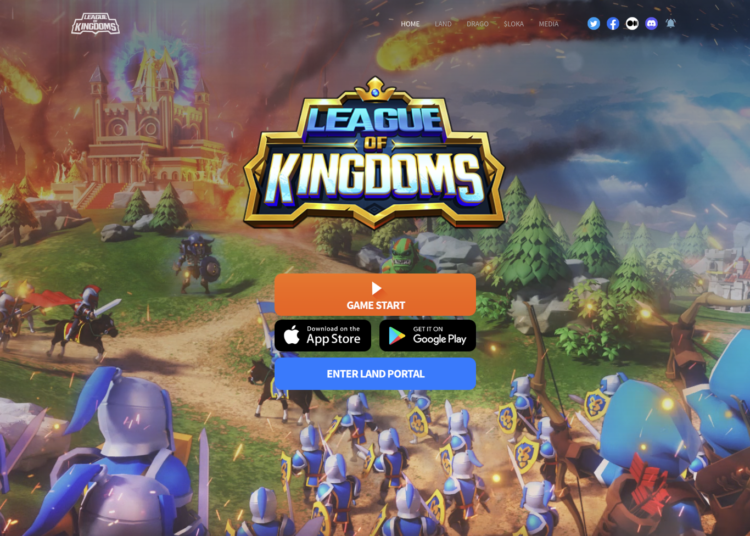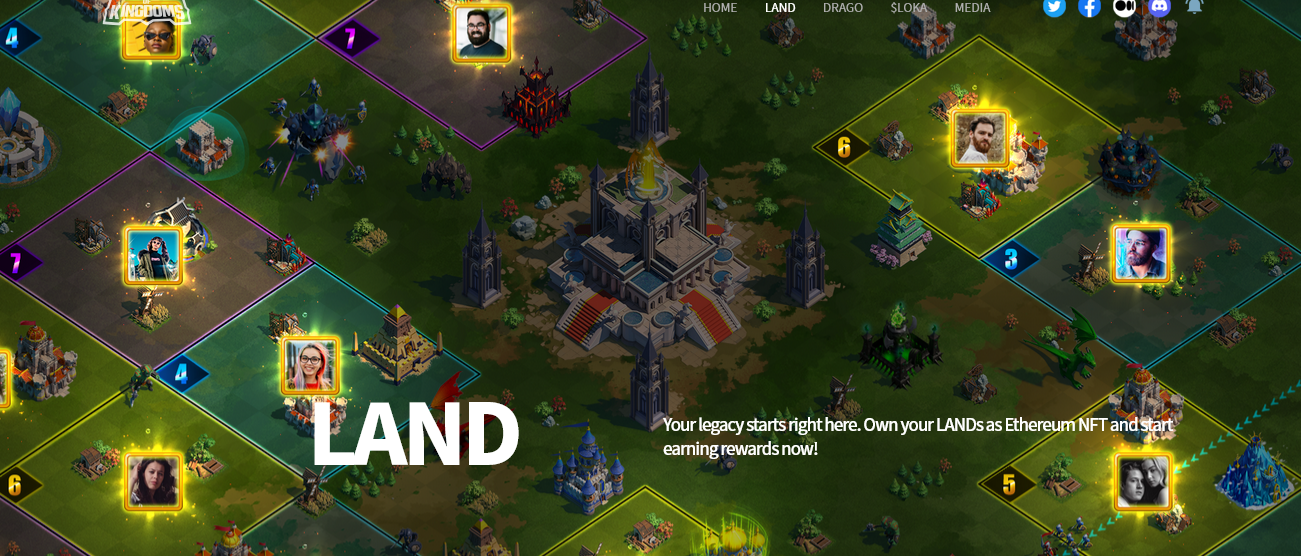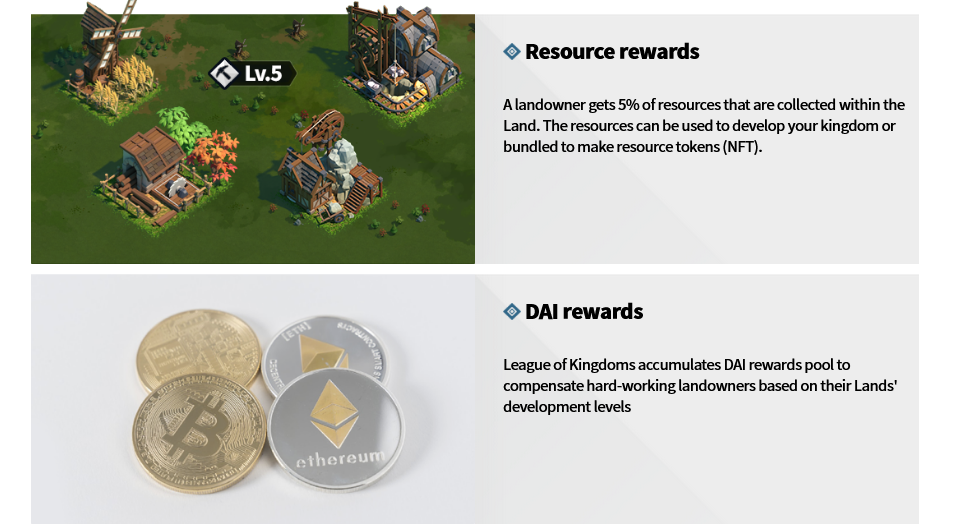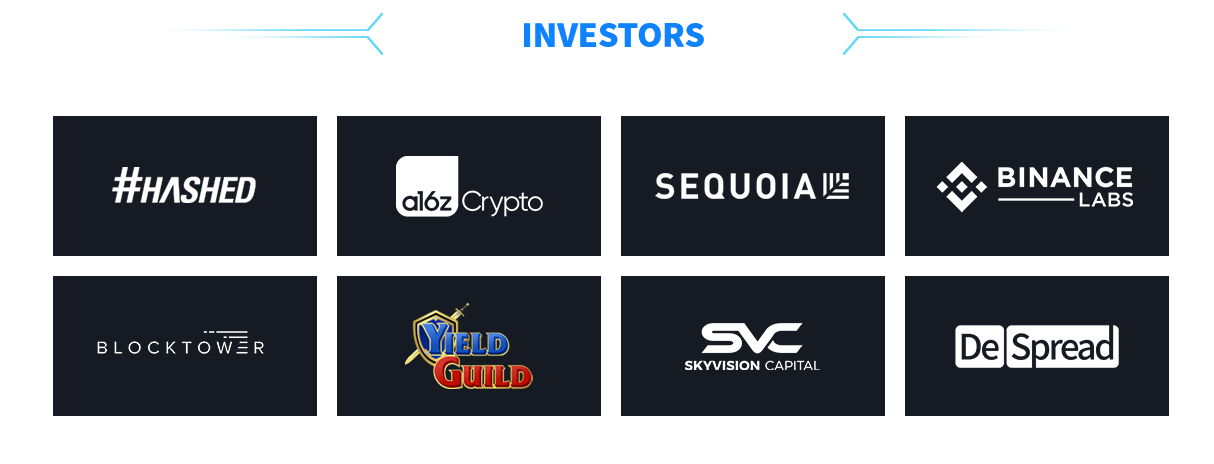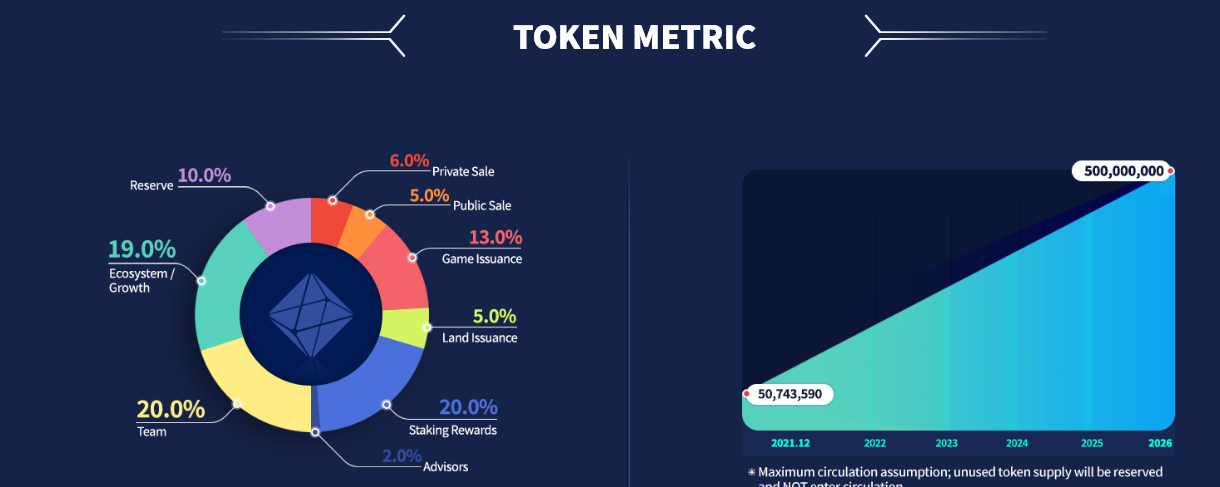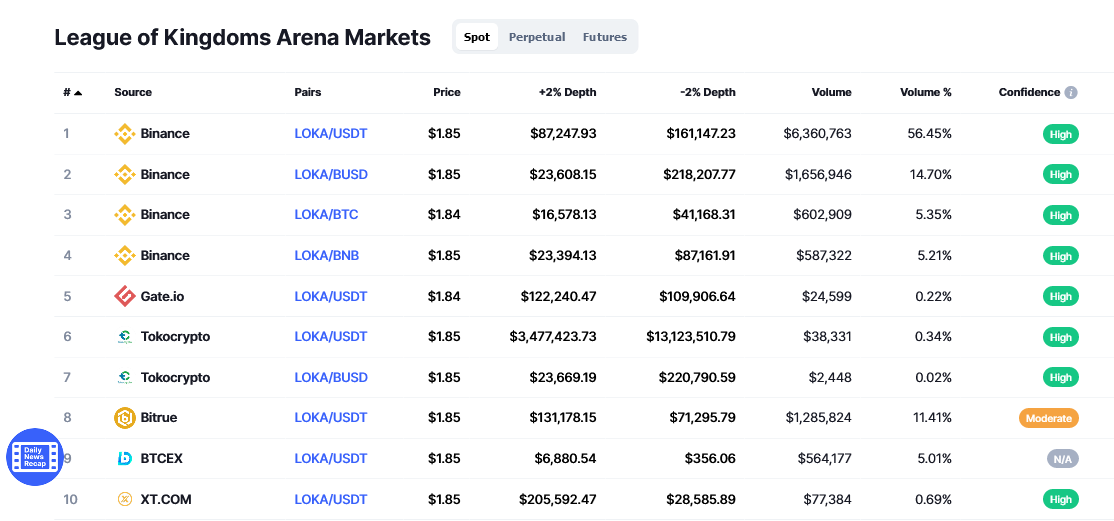League of Kingdoms is a free-to-play massively multiplayer online (MMO) game with NFT features on the Ethereum blockchain incorporating play-to-earn mechanics.
The game sets itself apart by allowing users to play in various modes, including single-player, PvE, MMO, and P2P, all without leaving the game. Also, a player doesn’t have to make some initial commitment by acquiring an asset.
League of Kingdoms has soared in popularity by remaining open to all players. The game is available online, and as mentioned, free to access, allowing you to play directly from the PC’s browser or mobile. It has similarities with other games like Game of Throne, Winter is Coming, and Rise of Kingdoms. Players familiar with these games can quickly transit to the League of Kingdoms and make money. Through their portal, they can gather resources and mint their first NFTs. It does this without compromising quality.
Building Strong Prosperous Kingdoms
The League of Kingdoms gameplay revolves around building kingdoms on land owned by gamers. As expected, gamers must forge alliances to strengthen their empires. From their activity, they rise up the ranks, forming an army to combat enemies.
Getting started with League of Kingdoms is easier. On-boarding is especially quick. The gamer need not be knowledgeable in cryptocurrencies or blockchain. Players don’t also need to download MetaMask except at later stages.
How to Play League of Kingdoms
The strategy game is simple to play.
You have to login—create an account and password. If not, you can log in directly from your Google account. Other alternatives include accessing the game from Facebook or Apple.
Being a strategy game, you will be required to collaborate by creating alliances and decimating enemies. New players start with primitive kingdoms to upgrade and expand.
While building a kingdom, they must inevitably collaborate by building alliances, clashing with other competing kingdoms, and participating in raids. As the kingdom grows, the player must train more soldiers, seek new resources, and in the process, earn more resources.
Building an alliance is crucial for a new kingdom to survive. It can also save up on resource deployment. It is also easier to build a stronger army and raid before competing kingdoms forge strong coalitions. Alliances also help when the kingdom is under attack.
Resources
Besides building and expanding their kingdoms, players must also work on the vast lands to gather resources and develop their armies.
Resources include corn, building materials like lumber and stone, and precious metals like gold and crystals. These are critical in gaining influence around your kingdom, upgrading infrastructures such as hospitals, training soldiers, and more. Resources act as fuel. Without them, the kingdom can’t function.
Crystals are the most critical resources in the game—needed in boosting almost any other feature of the game. They can be mined from the player’s land. At the same time, resources can be earned as rewards during quests or can be bought as NFTs.
How to Make Money in League of Kingdoms: Land NFTs and Resources
Already, League of Kingdoms holds the record as the first DeFi MMO game. A big part of this popularity is because of the game’s mechanics. Players can be hooked up for hours in the game, explaining why punters say the game could easily be the next Clash of Titans.
As mentioned earlier, a player doesn’t have to install MetaMask—required for storing in-game NFTs.
The game is free. A player can decide to play for fun without owning land. However, other ambitious gamers can choose to own land. These exist as NFTs compliant with Ethereum’s ERC-20 standard.
Land is a scarce commodity available in six levels. Landowners can easily participate in governance, even voting for their leaders. Each parcel can have a Totem—an ancient artifact as an NFT. It carries magic power and different statistics when included in a given land.
Landowners can earn passive income. For every in-game resource harvested, the landowner is entitled to five percent of what the player harvest on the owner’s territory. The landowner gets 10 percent from the pooled DAI accumulated by the League of Kingdoms to reward active owners depending on land’s development levels. The value of land will increase as the kingdom grows. Details of each land are available on the Land Portal.
Secondly, resources can be minted as NFTs and sold on secondary marketplaces like OpenSea. Minting can be on Ethereum or Polygon—the layer-2 sidechain of Ethereum. You can mint NFTs from one million, five million, or 10 million worth of resources. Resources are for players who want to enjoy the game but not invest money on land or other assets.
In addition, players can adopt Drago to earn DST. The utility token fuels the P2E ecosystem.
Meanwhile, the League of Kingdoms has introduced the LOKA token in collaboration with the TPA Metaverse foundation.
LOKA can be used to unlock powerful in-game NFTs, participate in governance through voting, stake LOKA for attractively high yields, and as a medium of exchange since you can buy skins and other game items.
Team and Partners
League of Kingdoms is developed by NOD Games—a leading game studio building open player-owned game platforms where gamers and communities own and thrive.
They comprise:
- Chanki Lee—the CEO
- Steve Hwang—the CTO
- Han Yoo—the COO
- Edgar Kim—the Chief Game Designer
- Sean Moo—the Chief Service Engineer
- Felix Lee—Chief Blockchain Engineer
Notable investors include Hashed, Sequoia, Binance Labs, Yield Guild, and Blocktower.
In December 2021, the team raised $3 million in a funding round led by Hashed. Funds are for expanding the “League of Kingdoms game franchise” through LOKA. Furthermore, funds acquired will be used to build the needed infrastructure for player-owned governance and enhance the play-to-earn economy.
League of Kingdoms (LOKA) Tokenomics
There is an assumed maximum supply of 500 million LOKA.
Distribution is as follows:
- 20 percent is allocated to the team
- 20 percent to staking rewards
- 19 percent to ecosystem development
- 13 percent to game issuance
- 10 percent to the reserve
- Six percent to the private sale
- Five percent to the public sale
- Two percent to advisors
As of late January 2022, there were 25.1 million LOKA in circulation. Each traded at $1.85 for a market cap of $46.4 million.
Investors who participated in LOKA’s IEO on the Binance Launchpad are up 11.57X in ROI at spot rates. The team raised $4 million from selling 25 million LOKA to investors at $0.16 per token.
LOKA is available on most markets, including Binance, paired with the USDT.
League of Kingdoms (LOKA) Catalysts
- The League of Kingdoms is free to play, offering new players an opportunity to earn NFTs.
- The game’s dual system of NFTs and LOKA is attractive, drawing both token and NFT traders to the game.
- NFTs can be minted on either Ethereum or Polygon. This choice allows players to save on Gas costs while reaping maximum profits when they mint and sell assets on supported secondary NFT marketplaces like OpenSea.
- League of Kingdoms appeals to crypto fans and gamers who demand complete decentralization. Holders of LOKA can vote on proposals.
- The game has included a staking program where 20 percent of all LOKA will be distributed to stakers. The more tokens are staked, the scarcer they become, a net positive for token holders.
- League of Kingdoms raised $4 million from their latest IEO on Binance and another $3 million from crypto venture funds led by Hashed. Since reputable investors are part of the League of Kingdoms, it points to a solid foundation to see the game’s valuation rise.
- The game has valuable partnerships with other DeFi, NFT, and game-centered protocols like Yield Guild Games (YGG), the SandBox, MakerDAO, and more. It contributes positively to the game via player onboarding, NFT trading, and more.
- Land NFTs can be traded for profits. By existing on a transparent blockchain, provenance is smooth. At the same time, the value of Land is tied to kingdom activity and development. The more the kingdom grows in stature, the more valuable Land becomes.
- Land can be a source of passive income for players and general investors. League of Kingdoms distributes accumulated DAI to landowners based on, among various factors, development levels. It encourages users to participate, driving up the value of Land and LOKA.
- Even in a bear market, LOKA is relatively stable, a pointer of the game’s solid foundation.
- The team is armed with the necessary skills to take the game to the next level, driving the value of LOKA higher. As per their roadmap, they plan to launch the PvP Arena and MMO Guild Game in H2 2022.
- The game is one of the most actively played, drawing players from over 21 countries. Notably, their retention rate is around 30 percent—which is 4X higher than games in similar categories in the legacy system.


